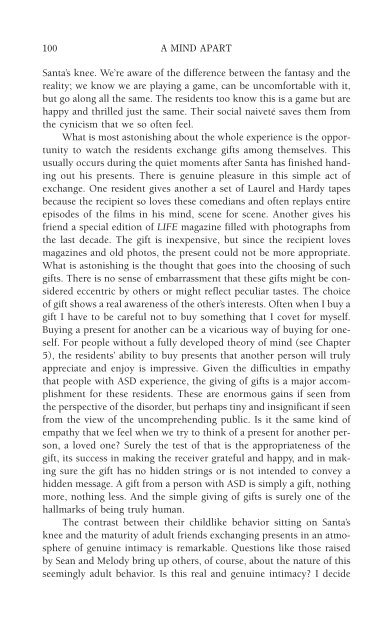978-1572305441
autism
autism
You also want an ePaper? Increase the reach of your titles
YUMPU automatically turns print PDFs into web optimized ePapers that Google loves.
100 A MIND APART<br />
Santa’s knee. We’re aware of the difference between the fantasy and the<br />
reality; we know we are playing a game, can be uncomfortable with it,<br />
but go along all the same. The residents too know this is a game but are<br />
happy and thrilled just the same. Their social naiveté saves them from<br />
the cynicism that we so often feel.<br />
What is most astonishing about the whole experience is the opportunity<br />
to watch the residents exchange gifts among themselves. This<br />
usually occurs during the quiet moments after Santa has finished handing<br />
out his presents. There is genuine pleasure in this simple act of<br />
exchange. One resident gives another a set of Laurel and Hardy tapes<br />
because the recipient so loves these comedians and often replays entire<br />
episodes of the films in his mind, scene for scene. Another gives his<br />
friend a special edition of LIFE magazine filled with photographs from<br />
the last decade. The gift is inexpensive, but since the recipient loves<br />
magazines and old photos, the present could not be more appropriate.<br />
What is astonishing is the thought that goes into the choosing of such<br />
gifts. There is no sense of embarrassment that these gifts might be considered<br />
eccentric by others or might reflect peculiar tastes. The choice<br />
of gift shows a real awareness of the other’s interests. Often when I buy a<br />
gift I have to be careful not to buy something that I covet for myself.<br />
Buying a present for another can be a vicarious way of buying for oneself.<br />
For people without a fully developed theory of mind (see Chapter<br />
5), the residents’ ability to buy presents that another person will truly<br />
appreciate and enjoy is impressive. Given the difficulties in empathy<br />
that people with ASD experience, the giving of gifts is a major accomplishment<br />
for these residents. These are enormous gains if seen from<br />
the perspective of the disorder, but perhaps tiny and insignificant if seen<br />
from the view of the uncomprehending public. Is it the same kind of<br />
empathy that we feel when we try to think of a present for another person,<br />
a loved one? Surely the test of that is the appropriateness of the<br />
gift, its success in making the receiver grateful and happy, and in making<br />
sure the gift has no hidden strings or is not intended to convey a<br />
hidden message. A gift from a person with ASD is simply a gift, nothing<br />
more, nothing less. And the simple giving of gifts is surely one of the<br />
hallmarks of being truly human.<br />
The contrast between their childlike behavior sitting on Santa’s<br />
knee and the maturity of adult friends exchanging presents in an atmosphere<br />
of genuine intimacy is remarkable. Questions like those raised<br />
by Sean and Melody bring up others, of course, about the nature of this<br />
seemingly adult behavior. Is this real and genuine intimacy? I decide



